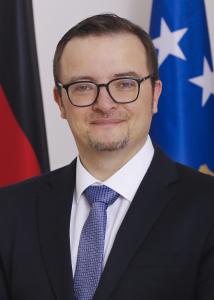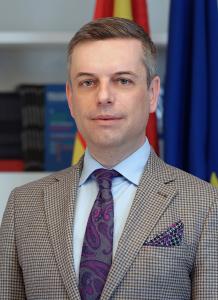The seminar was opened by Daniel Braun, official representative of the Konrad Adenauer Foundation, who stressed the importance of quality planning of policies, approach and measures by future mayors and councilors, to successfully conduct policies that bring solutions to citizens. Braun emphasized local challenges such as environment, infrastructure and modern administration. Braun underlined the support that KAS provides for strengthening the capacities of several structures from VMRO-DPMNE, through the parliamentary group, youth and women, to the candidates for holders of senior management positions at the local level.
David McAllister, Vice President of the European People's Party (EPP), addressed the opening via video conference, welcoming the cooperation between KAS and VMRO-DPMNE, with special reference to the good relations between the partners in building an open Europe and the country's accession to the European Union. Emphasizing the importance of the EU accession, McAllister reaffirmed the EPP's support for VMRO-DPMNE and the state Euro-integration path.
At the opening, the President of VMRO-DPMNE, Hristijan Mickoski, thanking the cooperation with KAS, stressed the importance of creating successful and quality policies at the local level, in order to foster reforms within local municipalities. Confirming that VMRO-DPMNE will lead a positive campaign that will abound in solutions and measures for the citizens in all municipalities, Mickoski focused on the benefits of successful planning and implementation of the promises given to the citizens.
The welcoming speeches were completed by Stefan Andonovski, Head of PIAC "Ljubisa Georgievski". Andonovski referred to the vision of the academy - which should serve the future mayors and councilors in the practical implementation of the election campaign, the preparation of the program, but most of all, in running the municipalities.
In the working part of the two-day academy, several prominent Macedonian and German politicians, scientists and practitioners addressed the audience. Aleksandar Spasenovski from the Faculty of Law, and former MP, presented to the participants responsibilities and legal framework for the Macedonian system of local self-government. The part of digital communication with the citizens was explained by Robert Hein, political advisor and communication trainer, as well as from Christian Zinke and Diana Peuker from PXN GmbH who talked about successful communication with the citizens during the digital era, as well as creating strategies and communication methods for the local self-government.
The first day was concluded by Vladimir Gjorcev and Ilija Dimovski, former MPs and members of the Executive Committee of VMRO-DPMNE. The lecturers referred to the organization of the working agenda of the candidates and successful communication with the citizens.
The second day of the Political Academy was opened by Marija Risteska, from the Center for Research and Policy Making, as well as Ana Krstinovska from ESTIMA, who spoke about creating policies that are friendly to women in local communities. Trajko Slaveski, former Minister of Finance and professor at the Faculty of Economics in Skopje, addressed the audience regarding the challenges and priorities of local economic development.
Jugoslav Gjorgievski from the Center for Legal Research and Analysis presented to the participants the legal and institutional challenges in the inspections for environmental protection at the local level. Aspects related to the creation of adequate political messages, but also certain aspects of public appearance and debate were discussed by Ivica Bocevski, former Deputy Prime Minister for European Integration, as well as the actors Robert Veljanovski, Jelena Zugic and Dejan Lilic. Stefan Andonovski, head of PIAC "Ljubisa Georgievski" discussed the involvement of young people in policy making. The working part of the academy was closed by Ljupka Naumovska from Rennes School of Business, who referred to the transformation of institutional (political) marketing, and building a strategy for political communication via the Internet.



















